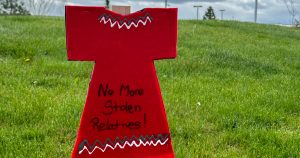By Casey Brown of the CUJ
The U.S. Constitution requires the U.S. Government to count every person once every ten years. The decennial count is known as the U.S. Census, and everyone is required to respond.
The 2020 Census starts on April 1 and can be completed in person, over the phone, or online. This year is the first time it can be filled out online. Each household will receive a notice in the mail to complete the Census, and they are encouraged to respond as soon as possible.
By May, Census takers will start visiting household that have not yet completed the Census.
On the Umatilla Indian Reservation, a Tribal Complete Count Committee (TCCC) was formed by the enrollment office of the Confederated Tribes of the Umatilla Indian Reservation (CTUIR). The goal is to ensure that all CTUIR and area tribal members and descendants are correctly counted as American Indian/Alaska Native.
“American Indians/Alaska Natives (AIAN) need to be counted completely as well as consistently,” said Elfrina Lubrin, enrollment administrative office manager.
It is important for Indians to be counted as American Indian/Alaska native because tribal nations do not share enrollment numbers with the government, so the Census is the main way that the government knows how many Indians there are, according to Census material.
The count includes descendants, as the race question is self-identifying.
“Your membership is a matter of self-identification, no proof is required; no one will ask you to show a Tribal ID of Certificate of Indian Blood (CIB),” according to then enrollment department.
Lubrin went on to say, “In regards to the race question, it has been determined that if you mark the AIAN box for race, you will need to enter ‘Umatilla Tribe’ as your Tribe. This will insure that our Tribe gets counted as a whole. This is opposed to answering, Cayuse, Walla Walla, Umatilla, or CTUIR.”
A major component of the Census is how billions of dollars in appropriations and funding is divided between federal departments, states, counties, cities, and tribal nations.
According to the TCCC, the stakes are high for a complete count in Indian Country. They estimate that for every missed tribal member it will cost tribes $3,000 per person, per year.
In order for Indians to be properly counted, those filling out the Census should follow a few simple guidelines from CTUIR’s TCCC.
First, an Indian adult should be listed as head of household, so the household is counted as an Indian household. Second, “Person 1” (the head of household) will mark only American Indian/Alaska Native as their race. Third, Person 1 will list their “enrolled or principal tribe,” as exactly “Umatilla Tribe.”
Responses are safe because they are “confidential and protected by law. Personal information is never shared with any other government agencies or law enforcement, including federal, local, and tribal authorities,” according to Census materials.
The Census is still recruiting for several jobs in Umatilla County. As of Feb. 28, Umatilla County had only achieved 66.7% of their hiring goal. The jobs are part-time with flexible hours. Recruiters have stated that the jobs are ideal for students, retired persons, and people look for a flexible second job, and more. To apply for one of several jobs available, visit www.2020census.gov/jobs.
For more information, contact CTUIR enrollment at 541-429-1971 or enrollment@ctuir.org.




